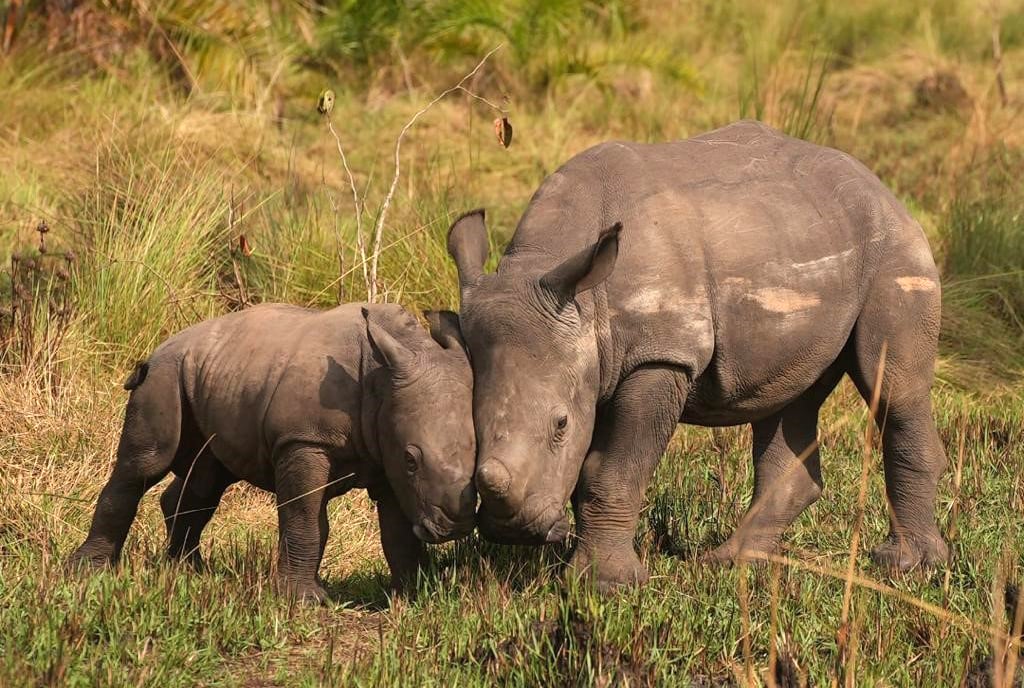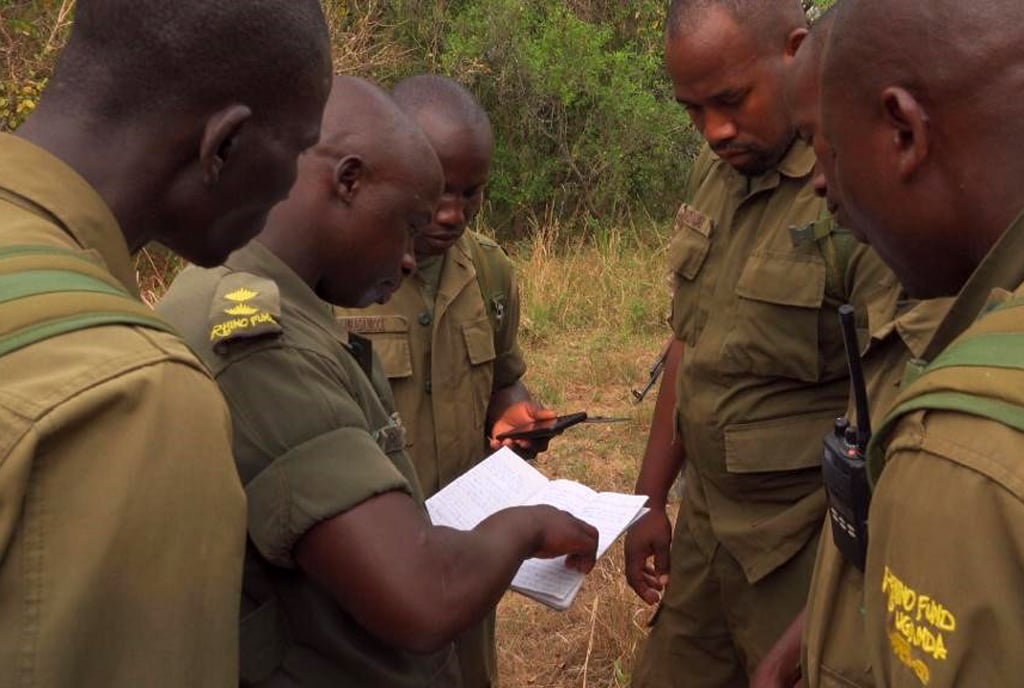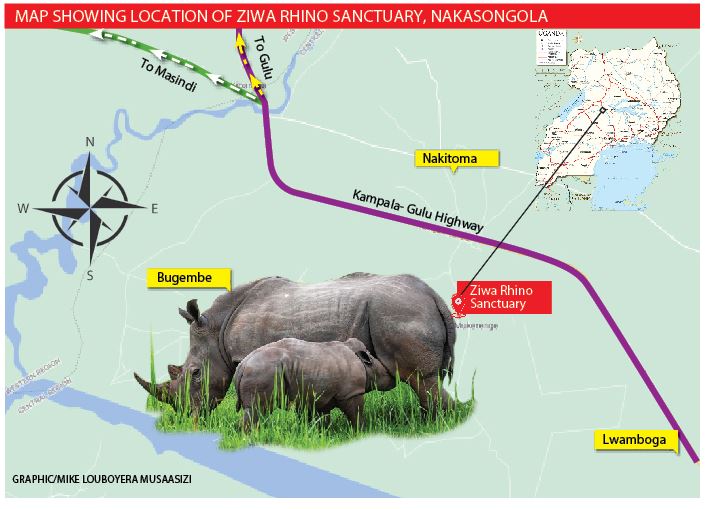Inside the fight to control Zziwa Rhino Sanctuary

Rhinos at Zziwa Rhino Sanctuary, Nakasongola. The place is a home to 33 rhinos. Photo/Coutesy
What you need to know:
- Zziwa Rhino Sanctuary, located about 176kms North of Kampala City, was established in 2006 as a protected area for re-introduction of the rear White Rhino family that had become extinct in Uganda. The Rhino Sanctuary that sits on a 16,000 acre land is now at the centre of dispute between the family of Capt Joseph Charles Roy who owns the lease and the management of Rhino Fund Uganda.
- Ziwa Rhino Sanctuary is a home to 33 rhinos re-introduced in Uganda through a breed and release programme supervised by the Uganda Wildlife but managed by the Rhino Fund Uganda in Nakasongola District.
- Uganda lost its first indigenous rhino species in 1983 when all the rhino species were completely wiped out through acts of poaching and the wars that ravaged the country
Zziwa Rhino Sanctuary is a story of miracle, faith and the resilience to reintroduce the rhinoceros in the country, the pulsating race to save it from extinction against the ever-growing appetite for the rhino horn that feeds the contraband market largely in the far-East.
Two species of rhinos once majestically roamed the savannahs and woodlands across Uganda’s national parks but poachers hunted them down by setting up deadly wire snares.
In central Uganda, a ravaging war in the treacherous jungles of Luweero pushed conservation to the back-burners resulting in its extinction in 1983.
The dream to reintroduce the rhinoceros in Uganda kicked off in 1998 when Rhino Fund Uganda was established.
After feasibility studies were conducted by rhino specialists, a 7,000ha breeding sanctuary for black and white rhinoceros was established at an expansive piece of grassland in Nakasongola District after two rhinos were translocated from Kenya.
A tourist gem, Zziwa Rhino Sanctuary, had by the time it was raided by machete-wielding men last week grown by leaps and bounds as tourists visited in droves to see the 33 rhinos.
The tourist site raked in dollars and transformed the area, which was once a backwater.
This incident, which led to its closure is part of the protracted fight to control Zziwa Rhino Sanctuary pitting the licensor of the land, businessman Capt Joseph Charles Roy, and the current administrators of the sanctuary.
The row has roped in President Museveni and the European Union (EU) Head of Delegation, Ambassador Attilio Pacifici, who has championed efforts to bankroll conservation in the country.
According to the October 16, 2017 letter seen by Daily Monitor from the law firm Omongole & Co Advocates, and addressed to the executive director of the Rhino Fund (U) Ltd Angie Genade calls for the termination of the licence.
“As you are well aware, Rhino Fund Uganda Ltd entered into an agreement to grant a licence with our clients Zziwa Ranchers Ltd, Capt Joseph Charles Roy. In the said agreement, it was stated that the licensor [Zziwa Ranchers Ltd/Capt Charles Roy] would grant part of its 62 sq km of land comprised in leasehold and mailo titles to the licensee, which is the Rhino Fund,” partly reads a letter.

Game rangers exchange ideas at Zziwa Rhino Sanctuary, Nakasongola. PHOTO/courtesy
It further reads: “Our client now wishes to give you notice of two years for termination of the licence granted and revoke all activities of the licensee at the sanctuary. We, therefore, hereby give you two years’ notice period to terminate the said agreement as duly instructed by our clients.”
On January 28, 2019, Omongole and Co. Advocates further wrote to the Rhino Fund Uganda executive director directing that they vacate specific properties, which were being illegally occupied.
“As per the concession agreement, the properties that Rhino Fund Uganda occupies were not part of the agreement and were not to be occupied by yourselves. This is to notify yourselves to give vacant possession of properties.”
Among the properties Rhino Fund was accused of possessing illegally included a house occupied by the human resource, a house occupied by the executive director, two double rooms occupied by volunteers, the main store block and the water pump borehole.
In 2018, while speaking to NTV, Richard Omongole said the administrators of the sanctuary were trying to grab Capt Roy’s land.
“The captain is denied access to his property. He is denied access to his home. He is denied access to his 16,000 acres of land and yet he had given just a small portion to her to build a lodge,” revealed Capt Roy’s lawyer.
But the Rhino Fund claims that the businessman had reneged on a binding agreement.
According to the August 20, 2002 terms of agreement made between Capt Roy, Geoffrey Ddingiro-Lwanga, Wolfang H. Thome and Yvonne C. Verkaik, which was drawn by Oscar Kihika of Byenkya Kihika and Co Advocates, it was agreed that the licensor will allocate space on the farm to the licensee to establish infrastructure to run the sanctuary ‘for a period of 30 years and subject to review every 10 years during the said term.’
This agreement was meant to expire in 2032 if the terms and the covenants were complied with.
Among the terms of the deal, it was agreed that ‘allocation of such space shall not operate as a demise of the land to the licensee by way of lease and the licensor shall at all material times be free and able to use the land so allocated for its farming activities in conjunction with the licensee.’
Among the covenants listed in the agreement, ‘it was stated that the licensee agrees not to use the land allocated for any purpose other than that breeding rhinos within the carrying capacity of the farm and purposes ancillary thereto except with the written consent of the licensor, which consent shall not be unreasonably held.’
The other covenants stated that the licensee will undertake to charge the fees for persons intending to visit the sanctuary and not to assign or part with possession of the allocated land or any part thereof without the consent in writing of the licensor.
Upon the threat of termination of the agreement, the Rhino Fund filed a civil suit in the High Court against Capt Roy protesting what they felt was an arbitrary action devoid of the terms of the agreement.
Speaking to Daily Monitor, Rhino Fund Uganda Board chairperson Vincent Opyene says the vacation order was not received well on the basis that ‘moving rhinos is not like moving cows.’
“It needs to be properly arranged. There are a lot of activities that happens in the sanctuary. There are lots of precautions that need to be taken to ensure that the rhinos are safe. We did not lose the rhinos way back just because of diseases, they were poached to extinction. You need to plan for this, remember the whole of that sanctuary is fenced in order to take care of this rhinos and somebody must be there monitoring these fences and somebody must be there ensuring that these rhinos; the males don’t fight to the extent of killing each other. Now if you are to tell me to move rhinos in two years, it becomes impossible,” he says.
Hoping to find an amicable solution, President Museveni called a meeting at State House, Entebbe in 2020 to mediate between the conflicting parties.
There was a thaw in the relationship and on October 1, 2020, High Court entered a consent judgement between the Rhino Fund and Capt Roy.
This consequently terminated the suit earlier on filed by the Rhino Fund.
A new memorandum of understanding (MoU) was signed between the parties on September 18, 2020 in the presence of Tourism minister Tom Butime. The MoU brought to an end the earlier on licensing agreement signed in 2002, whose term was meant to expire in 2032.
Under the new terms, it was agreed that the land where the sanctuary is situated comprising mailo and leasehold measuring 16,000 acres, belongs to Capt Roy who by this MoU confirms to “vesting it to Zziwa Rhino and Wildlife Ranch limited for management.”
“The parties hereby agree as advised by the President to maintain and use the land for conservation and related compatible activities. The parties further agree to review the agreement after a period of five years from the date of signing of this MoU. Both parties hereby acknowledge that the rhinos at the sanctuary are a property of the government of Uganda,” read the new agreement.
The MoU also established a board of directors of the Rhino Fund consisting of nine members. Three would be representatives of Zziwa Wildlife Ranch, which belongs to Capt Roy, four from the Rhino Fund as existing at the time of the signing of the MoU and two representing government.
One of the sticking issues that remained unresolved was in regard to revenue sharing. It had been resolved in the MoU that 20 per cent of the gross revenue from the sanctuary activities, excluding donations, be paid to Capt Roy’s Zziwa Wildlife Ranch and the larger share of 80 per cent of the gross revenue accruing from the sanctuary shall be used to run sanctuary operations and activities under the guidance of the board of directors of the Rhino Fund.

A game ranger at Zziwa Rhino Sanctuary. Photo/Courtesy photo
But Mr Opyene says Zziwa ranchers later demanded 100 per cent of the revenue.
Earlier on in 2010, Capt Roy who is a retired pilot, gave a concession agreement to the executive director Angie’s husband, Mr Nico Mark Genade, to operate a lodge at the ranch D&D International. Under the terms of the agreement, the Genades’ were to pay Capt Roy 10 per cent of revenue. But Roy later claimed that not ‘a single shilling has been paid by D & D.’
Threatened by eviction, in 2018, D &D International (U) Ltd filed a miscellaneous application before Jacqueline Lule, an arbitrator, seeing an interim measure of protection.
“An interim measure of protection hereby issues this April 12, 2018, stopping the respondent [Roy] and his agents and servants from re-entering, evicting and or interfering with the operations of Amuka Lodge until the final conclusion of all arbitration proceedings by the Arbitral Tribunal in CAD/ARB No. 70 of 2017,” ruled Lule.
Mr Genade, the director D & D Limited which runs Amuka Lodge, on February 6, 2019 had requested for police deployment. “Although we do have a valid interim measure of protection, several attempts have been made through the landlord to access the lodge and evict tourists, lodge management, and staff and take over possession of the lodge,” he says.
Earlier on in 2019, Omongole and Co. Advocates on behalf of Capt Roy had authored a letter to Mr Pacifici, which was copied to the World Bank and the UNDP, citing a number of grievances including an accusation that the EU was conniving with the Rhino Fund and could be seen as “land grabber or perpetrator of violations of land property rights in Uganda.”
EU response
On July 11, 2019, Ambassador Pacifici in a riposte to then Tourism minister Ephraim Kamuntu expressed shock about the content of the letter, which was not couched in diplomatic prose and he felt the plank of the message smacked of naivety.
“I will not comment on the writers’ lack of efforts to find a proper way to engage a diplomatic mission or on their noticeable lack of knowledge of the partnership agreement between the government of Uganda and the European Union, which stipulates, inter-lia, how the financing of development cooperation projects in Uganda takes place.”

The envoy writes further: “The writers also take the opportunity to lecture me about the violation of European Union property principles that a continued financing of the Rhino Fund Uganda would entail. —— At no stage during this process, would I have ever imagined that someone could come to the point of cautioning the European Union from funding ‘illegal activities’ in Uganda. All past efforts to support wildlife, national parks, forests and conservation efforts in Uganda both at policy level and on the ground, was done in partnership with the government to support its vision and objectives.”
Mr Pacifici implores government to do ‘everything possible to preserve, consolidate and further build on the success of the Zziwa Rhino sanctuary.’
Nakasongola authorities say
Nakasongola District chairperson Sam Kigula has also written to the President imploring him to intervene in the matter and ensure that the sanctuary is not permanently closed.
“Furthermore, Rhino Fund Uganda has been facilitating security issues in Nakitoma Sub-county, where it is located, paying school fees for some needy children, assisting the health centre III of Nakitoma by offering medical facilities and above all good working relationship with the district,” he writes.
Mr Opyene, who is a recipient of the prestigious 2018 Tusker Award for Conservation, says after the amendment of the Rhino Fund Uganda Constitution to allow the expansion of the board, representatives of Zziwa ranchers refused to attend a board meeting saying it was illegal.
“The ministry resolved that Captain Roy and ourselves should go have a meeting in the sanctuary and try to talk about the sticky [sticking] issues, how can we overcome these problems and move forward but we were surprised that it’s only the ministry officials, Uganda Wildlife Authority [UWA] and ourselves as Rhino Fund that turned up of the meeting,” he says.
Later on, the director conservation of UWA, Mr John Makumbi, offered to mediate between the conflicting parties.
“The first time we were asked the tough questions and they [Zziwa ranchers] said we don’t want the executive director Rhino Fund [Angie Genade] to be in the sanctuary if we are to negotiate anything. This was not in the terms of the MoU that we signed but because we felt we should look for a middle ground, we allowed and indeed we moved the executive director out of the sanctuary and established the office out of the sanctuary,” he says.
Mr Opyene says Zziwa ranchers then made a new request asking for audited books of accounts for the last five years.
“This was a tough decision that we couldn’t make ourselves, we needed to get back to the members of the Rhino Fund. When we got all the members of the Rhino Fund, we had a meeting and they resolved that we don’t have to give the books of accounts to Zziwa ranchers and we can only give them [the books of accounts] when they come on board,” he says.
About a fortnight ago, the mediation talks collapsed when Capt Roy alongside his lawyer stormed out of the meeting at UWA offices in Kampala and asked Rhino Fund to relocate the rhinos.
Barely an hour after the meeting, the sanctuary was raided by thugs, who posed as tourists destroyed houses and tried to expel rangers from their houses.
“We decided to call the police, the police managed to arrest these fellows, their statements were taken and they confirmed that they came in with permission and authority from Bakeheine who is a representative of Zziwa ranchers in the sanctuary. Their statements were taken and I believe they will be made to appear in court in the shortest time possible,” he says.
The Rhino Fund Uganda has been able to file a suit against the eviction and also received an interim order of injunction restraining Zziwa ranchers from disrupting the breeding programme.




